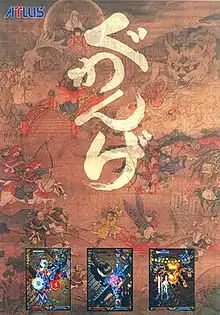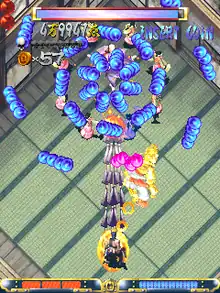Guwange
Guwange (ぐわんげ, Guwange, [ɡɯwaŋɡe]) is a vertical scrolling shooter developed by Cave and published by Atlus in 1999.
| Guwange | |
|---|---|
 | |
| Developer(s) | Cave |
| Publisher(s) | Atlus (Arcade) cave (Xbox 360) |
| Designer(s) | Kenichi Takano Junya Inoue |
| Composer(s) | Masahiro Kusunoki |
| Platform(s) | Arcade, i-mode, Yahoo! Mobile, Xbox 360 |
| Release | Arcade
|
| Genre(s) | Manic shooter |
| Mode(s) | Single-player, 2 player co-op |
| Arcade system | CAVE 68000 |
Gameplay

Guwange's gameplay contains elements that are unique or uncommon in the vertically scrolling shooting game genre. The screen will often scroll horizontally or even diagonally, depending on the course the protagonist must take to reach the demon leader. Each character has a limited bomb attack in the form of an energy blast that can be sent in any direction, and will dispel any bullets it touches. Another special attack involves sending the shikigami into the midst of the enemies, with two particular advantages. First, the shikigami does not have to attack in the same direction as the player is firing, and can even get past obstacles that would otherwise thwart normal shots. If an enemy projectile touches the shikigami, it will change to a pink color and will drastically slow down. If the shot passes the shikigami, it will return to its original color and resume at full speed; however, if the bullet is caught in an explosion, it will be cancelled and turned into coins.
Score is almost entirely dependent on the continuous, uninterrupted collection of coins. The player must constantly damage or destroy enemies in order to replenish a countdown timer; when the timer (represented by a meter in the upper-left corner of the screen) depletes entirely, the player's coin count returns to zero. Guwange is unique in that the player may maintain a "chain" of coin collection throughout the entire game, instead of a more conventional stage-by-stage approach. This makes Guwange's scoring system extremely unforgiving.
- Bosses
- Fujimura Shizuhiko (Stage 1 boss) (age 24). Bearer of the wood talisman. Although Fujimura appears to be an ordinary female dancer, this is not the case. "She" is actually a man named Fujihara Motohiko, who has accepted demonic power to get revenge on the clan that destroyed his family. The attendant dancers are actually demons assigned to assist Fujihara in his revenge, and to kill him if he shows signs of wanting to relinquish his power and reclaim his humanity.
- Madaramukade (Stage 2 boss). Bearer of the fire talisman.
- Nekogumo (Stage 3 boss). A horrific monster, part cat and part spider, and bearer of the earth talisman. She uses an abandoned temple for her lair, devouring any traveler hapless enough to come near.
- Kemonoyajiro (Stage 4 boss). A mysterious shrine that has been possessed by a man-eating demon, and is powered by the metal talisman.
- Ashikaga Sukouji (Stage 5 boss, phase 1). A descendant of one of the architects of the Ashikaga shogunate. However, because of his illegitimacy, his birth father condemned him as a "monkey's child", and banished him to live with a priest as an ascetic. When the priest died, he revealed the truth of Sukouji's parentage. Enraged, Sukouji assaulted his father's castle, empowered by Magira, the monkey demon whom Sukouji's father had unwittingly invited with his curse. Once Sukouji took the castle for his own, it became increasingly known for demonic associations, only intensifying when Fujihara entrusted the water talisman to Sukouji.
- Magira (Stage 5 boss, phase 2)
- Guwange-sama (Stage 6 boss, phases 1-2)
- Amagizu (age 400+) and Mikoto (age 5) (Stage 6 bosses, phase 3) Amagizu was a nun who was persecuted by the bakufu four centuries ago, and attempted to take refuge to give birth on the mountain that would be called Gokumon. As she bore her child, though, Guwange took the opportunity to possess it, transfiguring it into a demonic form and absorbing Amagizu's lower body. Since then, they have remained in this combined state, with Amagizu voicing Guwange's will to his subordinates. Mikoto, the daughter of Shishin, showed great spiritual power from her birth. Two years ago, though, she was discovered by Amagizu, and taken prisoner by her agents. Amagizu has been using Mikoto's power to amplify her and Guwange's own power, increasing their influence over the spirit realm and an ever-greater portion of Japan. Meanwhile, rumors of Mikoto's power have spread throughout the Ashikaga shogunate, and various lords have attempted to capture her from Gokumon in order to take that power for her own. Not a single person sent to capture her has come back from Gokumon alive.
Plot
The story of Guwange is set during the Muromachi period of Japan. During this time, increasing numbers of people suffer possession by shikigami. Although the shikigami grant great spiritual powers, the strain inflicted on the host causes them to die exactly one year after possession. However, a legend has sprung up regarding Guwange, the malevolent god trapped in Mt. Gokumon (i.e. Hell Gate). If one possessed by a shikigami can gather talismans of the five Chinese elements—wood, fire, earth, metal, water—from five demons serving Guwange, then infiltrate Gokumon and slay Guwange, the shikigami will be destroyed and the one possessed will not suffer a premature death.
- Characters
- Shishin (age 35), with shikigami Rikiou (age 500+). Attacks with kunai. Unlike most hosts of shikigami, Shishin has been able to live for more than a year after possession. This is because Rikiou has made an effort to keep Shishin alive, so long as he kills other humans for Rikiou to devour. The fact that Shishin never speaks, and always wears the mask of an oni, has led to commoners speaking of him as actually being the human-eating ogre in question. However, one day, Shishin experiences a vision of a goddess explaining to him how destroying Guwange will not only free him of Rikiou, but also restore the one he loves to him—his lost daughter Mikoto.
- Kamono Gensuke (age 15), with shikigami Kirinmaru (age 300+). Gensuke is in training as a pharmacist, and the son of an onmyouji. Kirinmaru is a bloodthirsty tengu who holds a grudge against the elder Kamono. To fulfill that grudge, Kirinmaru has possessed Gensuke. In order to channel the tengu's malice away from innocents, Gensuke has become a bounty hunter, all the while looking for a way to free himself from the curse.
- Hiiragi Kosame (age 17), with shikigami Yatsuhisha (age 200+). Attacks with bow and arrows. Kosame is a miko and member of a family of demon hunters. During a conflict with demons, Kosame became possessed by Yatsuhisha, a kitsune, and has been commanded by her father to exorcise herself of him by destroying Guwange. Unusually, Yatsuhisha is perfectly willing to help Kosame in this quest. Yatsuhisha was raised by a demon with little use for malice towards humans, and has come to regard Kosame as a close friend. Even though it would mean his own death, Yatsuhisha intends to put all his effort into saving Kosame from her own death.
Each player gets a unique introduction, and ending after completing the game.
Development
- Blue Label
The 'blue label' version of the game was originally a promotional item given to the three highest scoring players at a Cave hosted event.[1] On December 30, 2007 Cave fest, Cave unveiled a special edition of the game, which included increased difficulty in later chapters. The arcade game eventually appeared in cabinet format.[2]
Music
Cave released soundtrack for the game under the title Guwange/ESP Ra.De. original soundtrack album.
Releases
Mobile release
The mobile version was split into two separate games:
- I-mode version was designed for FOMA 900 and 901 series.
- Yahoo! Mobile version was designed for SH53, V601SH series.
Guwange DX is a version for mobile platforms in which the two-part mobile game was merged into a single game, with enhanced graphics.
Xbox 360 release
Developed by 5pb. Inc,[3] this version was released worldwide on Xbox Live Arcade on November 10, 2010. It includes the original game and 2 new modes, Blue (from the Cave fest release) and Arrange 360.[4]
In Xbox 360 mode, player fires automatically, with R trigger controlling shikigami independently.[5]
DLC include:
- Guwange Premium Theme 1 (2011/07/28, 240MP): Desktop theme.
- Guwange Premium Theme 2 (2011/07/28, 240MP): Desktop theme.
- Guwange icon pack 1 (2011/07/28, 160MP): 10 gamer picture pack.
- Guwange icon pack 2 (2011/07/28, 160MP): 10 gamer picture pack.
Reception
| Aggregator | Score |
|---|---|
| GameRankings | 77.14%[6] |
| Metacritic | 76/100[7] |
| Publication | Score |
|---|---|
| Edge | 8/10[8] |
| Eurogamer | 8/10[9] |
| GamesRadar+ | 3.5/5[10] |
| GameZone | 7/10[11] |
| Official Xbox Magazine (US) | 4/5[12] |
In Japan, Game Machine listed Guwange on their September 1, 1999 issue as being the seventeenth most-successful arcade game at the time.[13]
References
- “Gross! There’s goo on my wang!” (Guwange Released on North American XBLA)
- FS: Guwange Blue Label ROMs Archived 2012-07-14 at archive.today
- STGフェスタで『デッスマII』と『ぐわんげ』移植発表! 5pb.も新作STGを開発中
- Announcement in official blog Archived 2010-10-17 at the Wayback Machine
- 『ぐわんげ』2010年11月10日より配信開始決定!
- "Guwange for Xbox 360". GameRankings. CBS Interactive. Retrieved April 11, 2015.
- "Guwange for Xbox 360 Reviews". Metacritic. CBS Interactive. Retrieved April 11, 2015.
- Oct 2010, p.98
- Schillin, Chris (November 12, 2010). "Guwange Review". Eurogamer. Retrieved April 11, 2015.
- Kemps, Heidi (December 1, 2010). "Guwange review". GamesRadar. Retrieved April 11, 2015.
- Rowe, Brian. "Guwange review". GameZone.com. Archived from the original on November 13, 2010. Retrieved April 11, 2015.
- Feb 2011, p.76
- "Game Machine's Best Hit Games 25 - TVゲーム機ーソフトウェア (Video Game Software)". Game Machine (in Japanese). No. 594. Amusement Press, Inc. 1 September 1999. p. 17.
External links
- Official website (in Japanese)
- Cave mobile page: i-mode, EzWeb, Yahoo mobile
- Arcade-History page
- STG Wiki page
- Guwange at the Killer List of Videogames